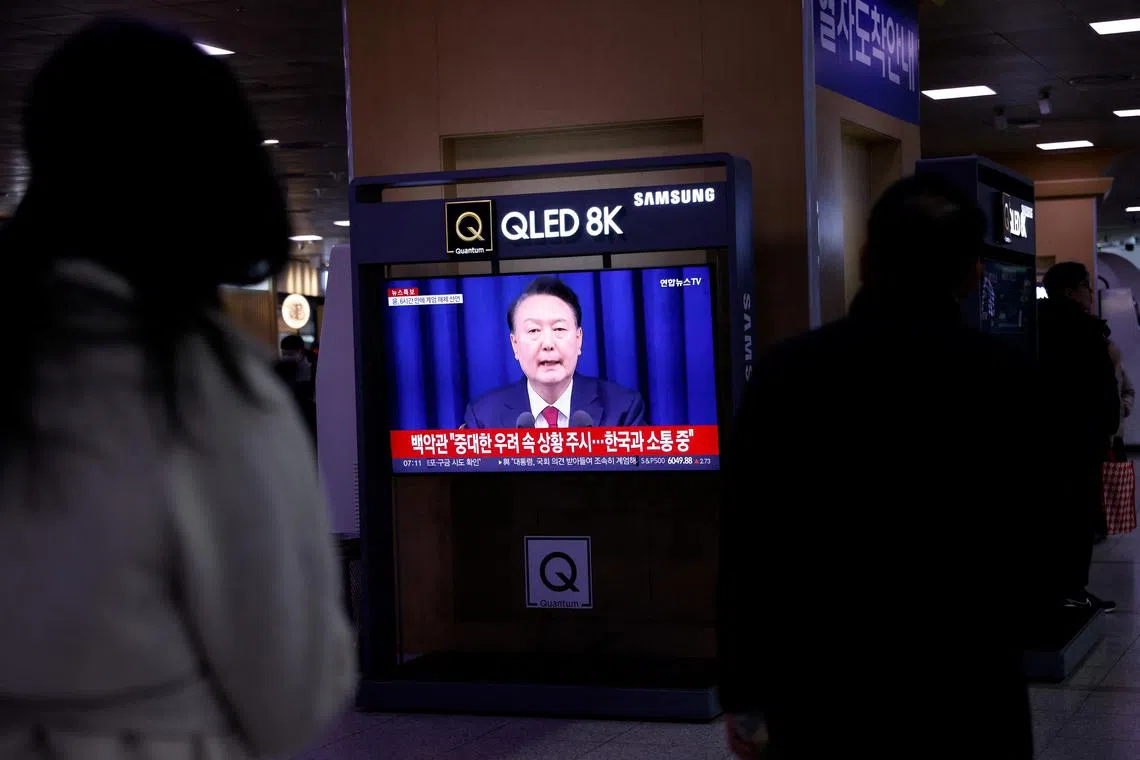South Korea’s whirlwind stint in martial law jolts markets
Sign up now: Get ST's newsletters delivered to your inbox

People watch a news report on President Yoon Suk Yeol's declaration of martial law in Seoul, on Dec 4.
PHOTO: REUTERS
Follow topic:
South Korean President Yoon Suk Yeol’s surprise decision to impose martial law in South Korea just as swiftly reverse course
In an emergency address delivered live to the nation, Mr Yoon stunned voters, lawmakers and investors alike by declaring martial law on Dec 3 after accusing the opposition of trying to paralyse his administration.
The decision, Mr Yoon said, was made to protect freedom and constitutional order, but the market’s early verdict was swift: South Korean-related exchange-traded funds (ETFs), its currency and most actively traded stocks all sharply weakened, while US government bonds and even Bitcoin were also briefly caught up in a risk-off flight to quality.
Korean shares and the won then regained some lost ground after South Korean authorities vowed to provide “unlimited liquidity” to markets as needed and lawmakers voted to request lifting the shock measure, which Mr Yoon ultimately agreed to do. Even so, the move, however brief, created fresh uncertainties within a major economy and pillar of global trade, keeping investors on edge.
“This is clearly going to raise longer term concerns about investing in Korea,” said Mr Mark Ledger-Evans, an investment analyst at Ninety One UK. “There will need to be a higher risk premium.”
The iShares MSCI South Korea ETF sank as much as 7.1 per cent in US trading, while London-listed shares of Samsung Electronics lost as much as 7.5 per cent. The onshore Korean won weakened as much as 2.9 per cent to 1444.65 per dollar, leading losses among currency markets amid thin trading during the New York session.
“The domestic uncertainty adds to the external pressures in recent weeks as the market is starting to price in the rise of higher US tariffs under the new Trump administration,” said strategist Aroop Chatterjee at Wells Fargo in New York.
Trading volume for the US$3.9 billion iShares MSCI South Korea ETF reached a record for any full day in the fund’s more than 20-year lifespan. About 32 million shares traded as at 1.45pm in New York, about 17 times the 20-day average for this time of day.
Other South Korean ADRs also declined. E-commerce company Coupang fell as much as 9.8 per cent in US trading, alongside losses in steel processor Posco Holdings and KB Financial Group. The Korea Exchange, the nation’s main stock bourse, said Dec 4 trading is under review.
The onshore won pared some of its losses, ending the session at 1428.5 per dollar. Still, the currency remains the worst performer in Asia this year, weakening by more than 9 per cent.
“Martial law feels like a bit of overkill,” said Mr Mark McCormick, global head of FX and EM strategy at TD Securities in Toronto. “Seems like the goal is deflection, reflecting low approval ratings and a fair amount of scandals. Policymakers like to keep a grip on KRW, so I would expect some of the volatility to settle down after today’s big move.”
Dec 3’s is the first overnight shock for the won, which began trading extended hours in July amid authorities’ broad push to get its stocks and bonds included in more global indexes. Previously, trading in the currency was halted at 3.30pm. local time.
Investors should go long the US dollar as the uncertainty persists, said Mr Win Thin, global head of markets strategy at Brown Brothers Harriman.
“President Yoon may have overplayed his hand but the situation remains fluid,” he said. “Coups in South Korea were a real thing when I was growing up but I think most (including me) believe the country had moved beyond that.”
The declaration of martial law will likely compound an already protectionist zeitgeist, according to Mr Joe Gilbert, a portfolio manager at Integrity Asset Management, adding that he believes “a viable off-ramp exists to ameliorate the situation with the Korean Parliament”.
In the meantime, Mr Gilbert said he’s watching semiconductor stocks, which he says may be winners in the short term if there is any disruption to chip production with the South Korean behemoth Samsung.
South Korean financial authorities said they will use all possible measures to stabilise markets, according to a statement from the authorities. The Finance Ministry pledged “unlimited liquidity” to the market, and the Bank of Korea said its monetary policy board will hold an extraordinary meeting on the morning of Dec 4. A decision on whether the local stock exchange will open is expected at 7.30am in Seoul. BLOOMBERG

